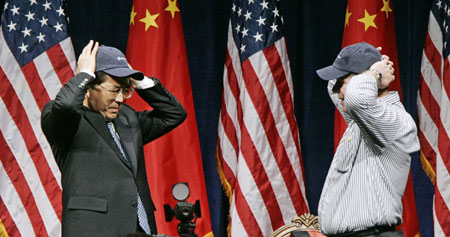Hu stands firm on currency
(Reuters)
Updated: 2006-04-20 07:09
EVERETT, Washington - President Hu Jintao on Wednesday stood firm
against U.S. demands to significantly revalue China's currency as a way of
reducing his country's vast trade surplus with the United States.
 |
|
| President Hu Jintao (L) puts on a Boeing baseball hat presented to
him by employee Paul Demier during his visit to the plane manufacturing
plant in Washington April 19, 2006. [Reuters] |
|
Speaking at a Boeing Co. plant outside Seattle on the eve of a White House
summit with President Bush, Hu said he wanted to make foreign-exchange markets
more efficient. But he said China was not ready for a drastic change in the
value of renminbi currency, also known as the yuan.
"Our goal is to keep the renminbi exchange rate basically stable at adaptive
and equilibrium levels," Hu said.
"China will continue to firmly promote financial reforms, improve the
renminbi exchange rate-setting mechanism, develop the foreign exchange market,
and increase the flexibility of the renminbi exchange rate," he said.
Revaluing the yuan is a key U.S. demand which officials say is vital to make
American exports more competitive, erase an advantage Chinese manufacturers
currently enjoy and reduce China's bilateral trade surplus, which last year
reached $202 billion.
A top U.S. official said this week China's progress on the currency issue had
been "agonizingly slow" and Bush was certain to raise it when the two leaders
met at the White House on Thursday.
But U.S. experts said they did not expect a breakthrough on the exchange
rate. Rather, they were hoping for slow, steady progress in the months ahead.
Hu said China did not seek a large surplus. "China takes the trade imbalance
between our two countries seriously and works hard to address this issue," he
said.
On the other hand, the fault did not all lie on China's side, he said. The
United States also needed to act to ease export controls and reduce
protectionist measures.
|